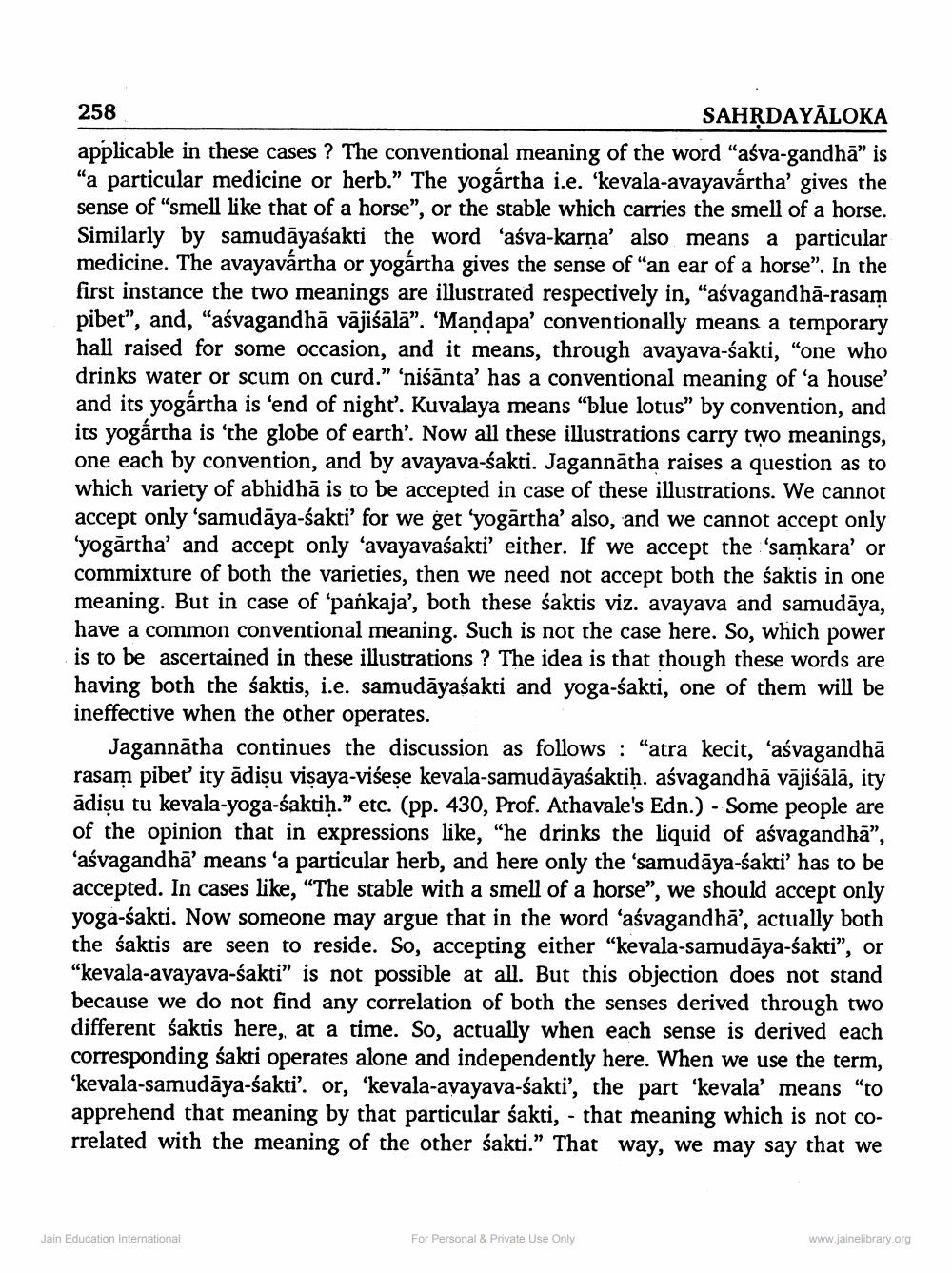________________
258
SAHRDAYĀLOKA applicable in these cases ? The conventional meaning of the word “aśva-gandhā” is "a particular medicine or herb." The yogártha i.e. 'kevala-avayavártha' gives the sense of "smell like that of a horse", or the stable which carries the smell of a horse. Similarly by samudāyasakti the word 'aśva-karņa' also means a particular medicine. The avayavártha or yogártha gives the sense of "an ear of a horse" first instance the two meanings are illustrated respectively in, “aśvagandhā-rasam piber”, and, "ašvagandhā vājiśālā”. 'Mandapa' conventionally means a temporary hall raised for some occasion, and it means, through avayava-sakti, "one who drinks water or scum on curd.” 'niśānta' has a conventional meaning of 'a house and its yogártha is ‘end of night. Kuvalaya means “blue lotus” by convention, and its yogartha is 'the globe of earth'. Now all these illustrations carry two meanings, one each by convention, and by avayava-śakti. Jagannātha raises a question as to which variety of abhidhā is to be accepted in case of these illustrations. We cannot accept only 'samudāya-śakti' for we get 'yogārtha' also, and we cannot accept only 'yogārtha' and accept only 'avayavaśakti' either. If we accept the 'samkara' or commixture of both the varieties, then we need not accept both the śaktis in one meaning. But in case of 'pankaja', both these saktis viz. avayava and samudāya, have a common conventional meaning. Such is not the case here. So, which power is to be ascertained in these illustrations ? The idea is that though these words are having both the saktis, i.e. samudāyasakti and yoga-sakti, one of them will be ineffective when the other operates.
Jagannātha continues the discussion as follows: "atra kecit, 'aśvagandha rasam pibet' ity ādiņu visaya-viśese kevala-samudāyaśaktiḥ. aśvagandhā vājiśālā, ity adisu tu kevala-yoga-saktih.” etc. (pp. 430, Prof. Athavale's Edn.) - Some people are of the opinion that in expressions like, “he drinks the liquid of aśvagandhā”, ‘aśvagandhā' means a particular herb, and here only the 'samudāya-śakti' has to be accepted. In cases like, “The stable with a smell of a horse", we should accept only yoga-sakti. Now someone may argue that in the word 'aśvagandhā', actually both the śaktis are seen to reside. So, accepting either "kevala-samudāya-śakti”, or "kevala-avayava-śakti" is not possible at all. But this objection does not stand because we do not find any correlation of both the senses derived through two different śaktis here, at a time. So, actually when each sense is derived each
esponding sakti operates alone and independently here. When we use the term, ‘kevala-samudāya-sakti'. or, 'kevala-avayava-sakti', the part 'kevala' means "to apprehend that meaning by that particular sakti, - that meaning which is not correlated with the meaning of the other śakti.” That way, we may say that we
Jain Education International
For Personal & Private Use Only
www.jainelibrary.org




